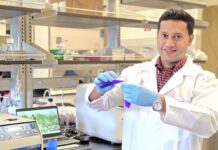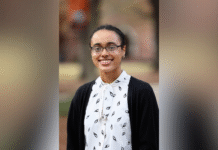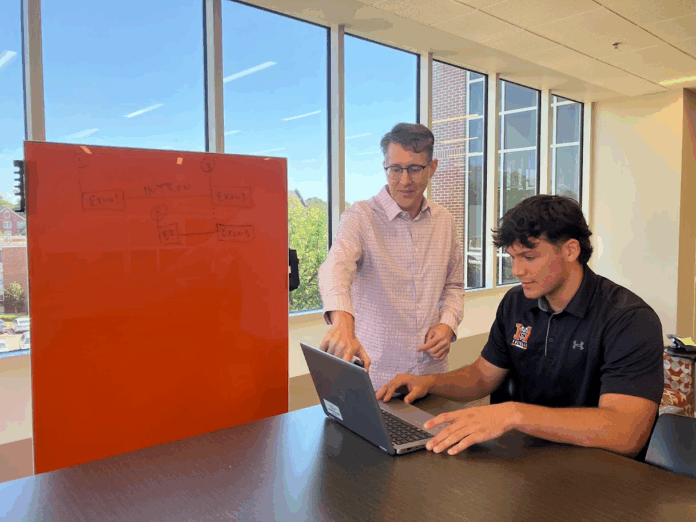
Through involvement with a national collaboration, Dr. John Stanga has helped dozens of Mercer University students get research experience while making contributions to genome annotation projects. An associate professor of biology, he was awarded Mercer’s 2024-25 EXPy Award for excellence in experiential learning earlier this year for this work.
“It’s certainly an honor,” Dr. Stanga said of the recognition. “It’s nice to be recognized, of course, by my colleagues and by the college, but just being nominated by my students is rewarding in and of itself.”
Dr. Stanga, who came to Mercer in 2016, specializes in genetics and molecular biology. He connected with the Genomics Education Partnership, or GEP, during the COVID-19 pandemic because his students needed an online lab, and he has remained involved because of the unique opportunities offered.
GEP is a national collaboration of institutions that is devoted to making research experiences in bioinformatics and genomics more available and accessible to undergraduate students and faculty, Dr. Stanga said. Partner institutions can contribute to web-based research projects related to genome annotation. A genome is all the DNA in an organism, which basically contains all the instructions needed for it to develop and function, and genome sequencing is the process of finding the exact order of the chemical building blocks of that DNA.
“A genome sequence is simply the raw data, the millions or billions of letters of DNA and what our GEP partners generate and provide to our student researchers. The next step is annotation — identifying and refining the DNA sequences that encode information, also known as genes,” Dr. Stanga said.
The cost of genome sequencing has decreased greatly over the years, creating many more opportunities for experiments and discovery. Computer programs can be used for some of the annotation work, but they don’t always get the details right and sometimes miss things, Dr. Stanga said. That’s where the GEP community comes in. A lot of what is known about genetics today stems from the study of Drosophila melanogaster — also known as the fruit fly — and GEP institutions have been analyzing data from a couple dozen species.
“Students can see different computer predictions of where a gene is, or what the structure of a gene is … and they have to look at all the available evidence and sort of determine what the best structure of a gene is,” Dr. Stanga said. “By having a lot of different species, we can do what’s called a comparative genomics approach. So we’re basically just comparing a particular gene in all of these different species and looking for what structures of the gene have been maintained over time by evolution, or conserved, and which structures have changed over time and are a little different.”
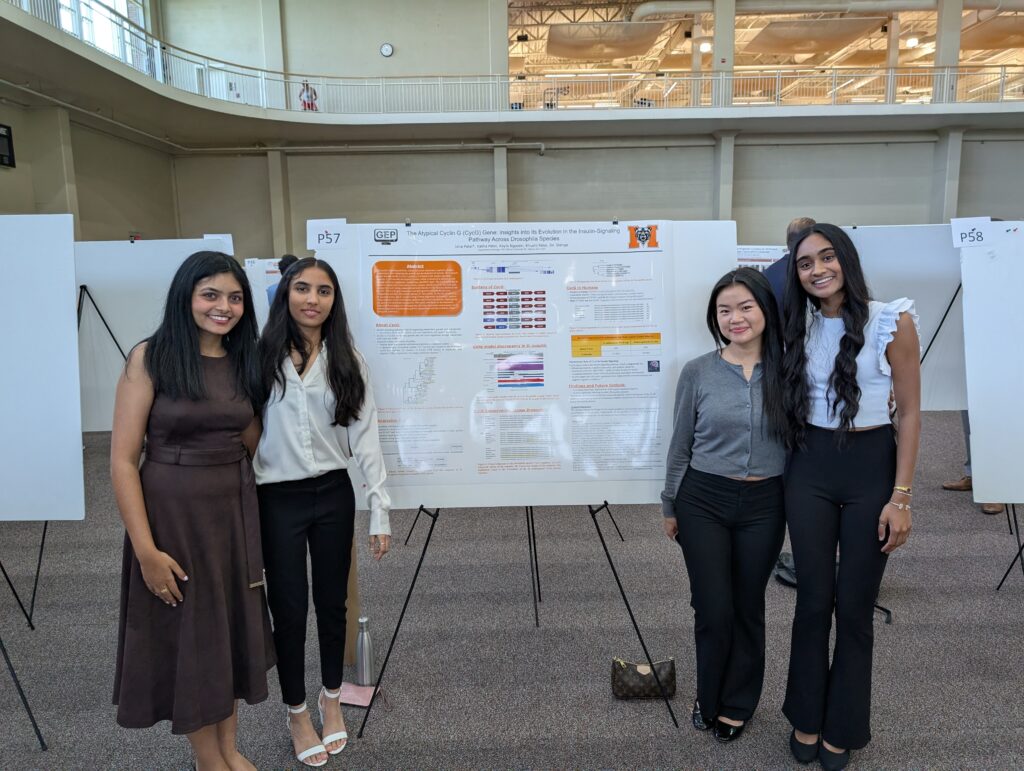
Dr. Stanga’s students have been involved in two GEP projects. Since 2020, his genetics classes have worked on “F Element,” which revolves around understanding the chromosomes in fruit flies. Students doing independent research with him have mainly worked on the “Pathways” project, which looks at insulin-signaling pathways in fruit flies.
Kayla Rhyne, a 2024 biology graduate who is now a medical student on Mercer’s Savannah campus, was fascinated by the gene work she did in Dr. Stanga’s genetics class, which spurred her to continue doing GEP research independently with him until she graduated. She analyzed about five genes during that time.
“I thought working with genes was really interesting, and I really liked working with Dr. Stanga,” she said. “We share a large portion of our genes, specifically the insulin signaling pathway, with Drosophila melanogaster species.”
Hannah Griffin, a 2025 biochemistry and molecular biology graduate, spent four semesters working on GEP projects as a Mercer student, first in class and then separately with Dr. Stanga. She has continued that involvement this year through GEP’s new Advanced Research Lab initiative, through which she and Dr. Stanga are looking at a gene called ImpL2.
“Part of the mission with the GEP is working with students across the entire nation,” said Griffin, who is a clinical research coordinator for the Medical College of Georgia and will begin her studies as a medical student there next year. “What drew me to the GEP is its accessibility to other students and the opportunity to work on something I find important and interesting and providing mentorship.”
Because the GEP projects are computer-based, Dr. Stanga has had flexibility to work with more students and accept students in need of research mentors. He has mentored about 40 research students since fall 2023, some of whom have moved into related, laboratory research with Dr. Stanga.
Through the GEP projects, students gain skills in critical thinking, careful reading, written and oral communication, and networking. They also develop their computer skills and learn new programs, such as the BLAST, a commonly used bioinformatic tool. Students have presented their findings at BEAR Day, regional conferences such as the Association of Southeastern Biologists, and virtual GEP events.
“My reward is from seeing the students grow or become interested. If they see value in it, then I think that’s great,” Dr. Stanga said.
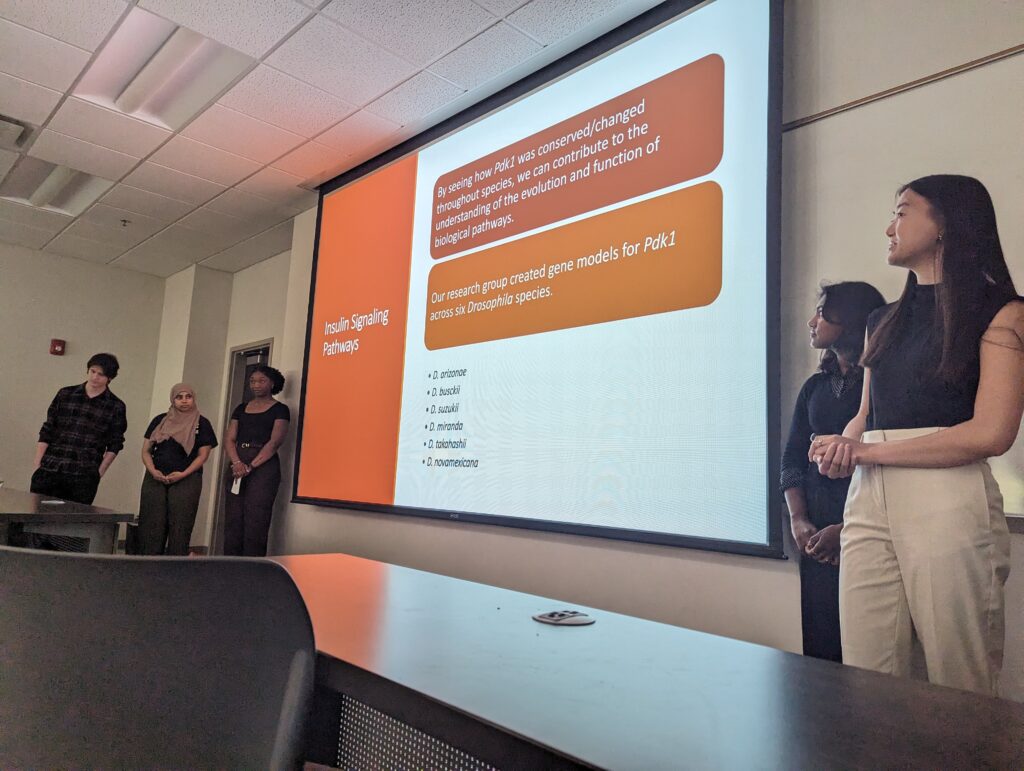
The students’ research contributes to the larger goals of GEP, and some of their findings have been used in academic publications. A paper on the F Element project is currently going through review stages. Smaller portions of findings from the Pathways project are being included in microPublication Biology, and one article has already been published with Mercer co-authors. Data will also be submitted to the National Center for Biotechnology Information and bioRxiv databases.
In addition, Dr. Stanga will lead analysis and writing for individual, traditional reports that highlight individual genes across the fruit fly species.
“As authentic research, the goal is not just to get the students doing something but also that what they’re producing is valuable to the broader scientific community. So we really want to disseminate our results,” Dr. Stanga said.
Dr. Stanga was nominated by multiple students for the EXPy award over the last two years. In their submissions, they lauded Dr. Stanga for his time, patience and dedication to helping them understand the concepts and research methods.
“While having class with him, I would frequently visit his office hours because genetics is complicated,” Rhyne said. “He would be able to explain things in a way that I could understand. I just really appreciated that he wasn’t just teaching you about the subject, he was teaching you lifelong skills on how to learn complicated science things.”
Rhyne said working with Dr. Stanga taught her skills and thought processes that she uses every day in medical school.
“He’s truly the most fundamental mentor that I had at Mercer,” Griffin said. “Through his mentorship, I’ve learned how to push my own limits and how to believe in myself more. That welcoming environment that he creates for students in classes, research and mentorship, it’s not something you come across every day.”


